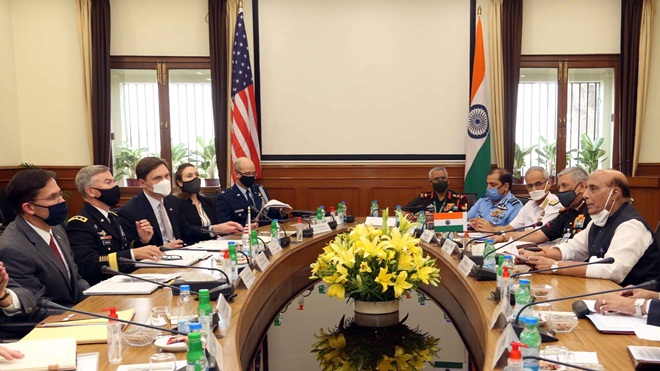Parmita Uniyal
Locked in tensions with China on the LAC for almost six months, India is set to sign pact with the US for satellite data which would help its missiles and drones target the enemy locations with much more precision.
The pact will be signed on Tuesday by the two countries during the third 2+2 bilateral dialogue for which US Secretary of State Michael Pompeo and Secretary of Defence Mark Esper have flown to New Delhi days ahead of Presidential elections back home.
The high-level meeting is referred 2+2 as defence and foreign ministers from the two countries participate in the talks. This is third 2+2 bilateral dialogue between the two nations.
India’s Minister of Defence Rajnath Singh and Minister of External Affairs Dr. S. Jaishankar had flown to Washington DC for the last 2-2 dialogue. The Ministers from both sides in their meeting had resolved to work together in the 2+2 framework to “realize the full potential of the India-U.S. strategic global partnership.”
The first two 2+2 Ministerial dialogues were held in New Delhi in September 2018 and in Washington DC in 2019. The agenda for the third Dialogue covers all bilateral, regional and global issues of mutual interest.
The agreement for sharing satellite data would be signed under Basic Exchange and Cooperation Agreement (BECA) for geo-spatial cooperation. The proposed pact will allow the two countries to share military information including advanced satellite and topographic data such as maps, nautical and aeronautical charts and geodetic, geophysical, geomagnetic and gravity data.
The pact is being seen as a strong message to China which has been often accused of expansionist tendency. The US President Donald Trump has been scathing in his attack on the Asian economic power for its handling of Coronavirus and also its neighbourhood policy.
Closer to Presidential elections, Trump has minced no words in targeting China. He had earlier imposed trade barriers on Chinese imports and targeted Chinese technology companies such as Huwaei and TikTok. China had termed the Trump administration’s action as “bullying” of its tech firms.
“Some individual countries are aggressively pursuing unilateralism, throwing dirty water on other countries under the pretext of ‘cleanliness’, and conducting global hunts on leading companies of other countries under the pretext of security,” China’s State Councillor Wang Yi had said.
“This is naked bullying and should be opposed and rejected,” he was quoted by British news agency BBC.

